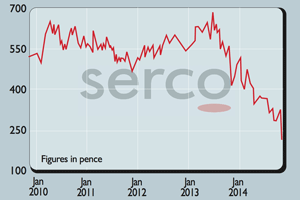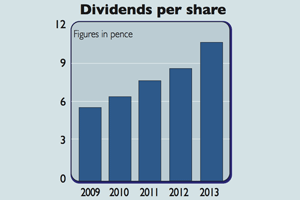Shares in focus: Can Serco recover from years of hubris?
New boss Rupert Soames has been tasked with turning outsourcer Serco around. Can he do it, and should you buy the shares? Phil Oakley investigates.
Get the latest financial news, insights and expert analysis from our award-winning MoneyWeek team, to help you understand what really matters when it comes to your finances.
You are now subscribed
Your newsletter sign-up was successful
Want to add more newsletters?

Twice daily
MoneyWeek
Get the latest financial news, insights and expert analysis from our award-winning MoneyWeek team, to help you understand what really matters when it comes to your finances.

Four times a week
Look After My Bills
Sign up to our free money-saving newsletter, filled with the latest news and expert advice to help you find the best tips and deals for managing your bills. Start saving today!
The outsourcer is overpriced and its profits are falling avoid, says Phil Oakley.
Hindsight is a wonderful thing. But the experience of UK outsourcing company Serco, over the last few years, looks like a classic case of hubris.
For years it looked as if Serco could do no wrong. As national and local governments around the world outsourced more tasks to the private sector, it made more and more money, doing things such as looking after prisoners, running trains, managing defence systems and carrying out work for the NHS.
MoneyWeek
Subscribe to MoneyWeek today and get your first six magazine issues absolutely FREE

Sign up to Money Morning
Don't miss the latest investment and personal finances news, market analysis, plus money-saving tips with our free twice-daily newsletter
Don't miss the latest investment and personal finances news, market analysis, plus money-saving tips with our free twice-daily newsletter
The company became so successful at hoovering up new contracts for work and enjoying the high rates of revenue growth that came with it that it became overconfident.
It seemed to believe that it could apply its business model to almost any line of work it wanted to take on. So it branched out into new countries and new business areas.
For a while all seemed well. But in early 2013 things started to unravel. It became embroiled in controversies about badly managed contracts to transport prisoners and was accused of overcharging the government.
A series of profit warnings then followed, along with the unexpected departure of the chief executive. Since then, Serco's share-price chart has looked decidedly ugly.
Last week, Rupert Soames, the new man in charge of Serco, admitted that his strategic review of the company has revealed it's in a real mess. "We've gone up the street saying bring out yourdead' and lots of bodies started flyingout the windows," he told investors.That caused share price to plummet further, dropping by a third in one day.
While that sounds bad, sometimes companies in these situations can make very good investments, providing that profits can recover. So can Soames and his team fix Serco, or is the company a basket case you should stay well clear of?
The outlook
In a nutshell, its financial position is unsustainable. So it is going to have to raise lots of cash to get back on a stable footing. It will do this by selling off businesses it no longer wants and by asking shareholders for £550m in a rights issue early next year.
Rights issues have a tendency to frighten investors. With Serco this looks to be justified. Any rights issue will probably have to offer shareholders new shares at a big discount to the prevailing share price, to get them to sign up.
But getting back to a sound financial position is only the beginning of the process. What's of more concern to shareholders is that the company's profits could continue falling for some time to come. In 2013, trading profits were £285m. This year they are likely to be £140m, at best, before falling further to £100m in 2015. Soames reckons that things could still get worse than this.
He reckons that revenues could bottom out as low as £3bn in 2016, with profit margins of possibly 2%, suggesting trading profits of just £60m.
The trouble with Serco and a lot of outsourcing companies is that it is very difficult for outside investors to work out what kind of sustainable profits it can make. The problem is that it's just not as easy for these types of company to make money as it used to be.
Competition has increased and is putting pressure on profit margins. Governments have also wised up and are now a lot smarter at getting value for money for the taxpayer. A lot of risks such as cost increases have been passed back to the contractor.
Soames has tried to offer some hope for better times in the future. Serco is going to concentrate on things it is good at, such as defence, justice and immigration, transport, citizen services and health care. It reckons that these areas can offer rates of sales growth of 5%-7% a year with profit margins of 5%-6%.
If this is achievable, then perhaps Serco could be making £180m-£200m of trading profits in five years' time. However, at the moment, Serco has an enterprise value (the market value of its shares plus average net debt) of just under £2bn, which implies the kind of sustainable profits it hopes to make are a given.
That is a brave assumption to make. With a big rights issue yet to come, Serco's shares are still trading at far too high a price to make them worth a bet.
Verdict: avoid
Serco (LSE: SRP)


Directors' shareholdings
Get the latest financial news, insights and expert analysis from our award-winning MoneyWeek team, to help you understand what really matters when it comes to your finances.
Phil spent 13 years as an investment analyst for both stockbroking and fund management companies.
-
 Should you buy an active ETF?
Should you buy an active ETF?ETFs are often mischaracterised as passive products, but they can be a convenient way to add active management to your portfolio
-
 Power up your pension before 5 April – easy ways to save before the tax year end
Power up your pension before 5 April – easy ways to save before the tax year endWith the end of the tax year looming, pension savers currently have a window to review and maximise what’s going into their retirement funds – we look at how